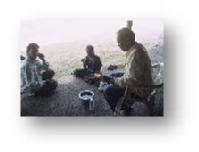Situating the Subaltern in South Asian Medical History
Situating the Subaltern in South Asian Medical History
Workshop
7-8 May 2009
University of Warwick
Organiser: David Hardiman (Warwick)
This workshop sought to establish the terms and conditions for a field of study that sets itself apart from most of the existing studies in South Asian medial history, which focus either on the history of biomedicine, particularly colonial biomedicine, or the classical systems of Ayurvedic and Unani Tibb, as practised by elite physicians. Even today, these forms of healing are hardly available for large numbers in South Asia, either on grounds of cost or because of lack of facilities. This situation has allowed for a range of healing practices to flourish alongside each other. There are unqualified or so-called ‘quack’ healers who mix allopathy and popular remedies together eclectically, local barber-surgeons, bonesetters and masseurs, cauterisers, village midwives, travelling mendicants with their cures, priest at healing shrines, faith healers, exorcists, and herbalists. Many cures are carried out within the home, using charms, rituals, and plant-based remedies. The workshop examined these various forms of healing, and sought to place them theoretically within South Asian medical history.

 Workshop report
Workshop report